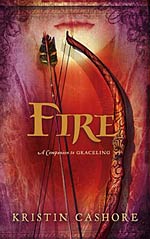
![]() Rhetori_Cat
Rhetori_Cat
1/21/2013
![]()
Kristin Cashore's 2009 novel Fire is a companion to Graceling rather than the sequel I was hoping for. Instead, we travel back in time with Graceling's primary antagonist to witness his first attempt to take over a kingdom, this time the Dells, a land separated from the seven kingdoms by an impassable mountain range. While Fire doesn't continue the story of Katsa, it does pick up on several of the themes from Graceling that I found interesting.
The Plot: The Dells is a kingdom populated with both regular varieties of recognizable animals and people and monster varieties: unnaturally brightly colored creatures with the mental abilities to ensnare regular human and other animals in order to make them easier prey. While monster animals are widely prevalent, monster humans are much more rare; in fact, there is only one, named Fire after her widely colored red hair. Lady Fire lives in relative seclusion in the northern part of the kingdom for two reasons: 1) many people are unable to control their attraction to or strong reaction against her and she must constantly be on her guard, and 2) her father, Lord Cansrel, basically ran the kingdom into the ground through his control over the previous king and insatiable desire for chaos and strife. As much as Fire prefers her quiet life, teaching local children music and how to guard their minds against the monsters and spending her evenings with childhood friend and part time lover Lord Archer and his father, the unrest in the kingdom results in Prince Brigan, commander of the King Nash's army, escorting her to the King's City to assist in wartime preparations and spy operations. For some time, Fire resists using her impressive mental abilities to break into the minds of captured spies and enemies, but twins Prince Garan and Princess Clara convince her of her responsibility to the kingdom. As Fire gets more involved with political intrigue, she also gets more involved with Prince Brigan and his daughter Hanna, before finding herself facing young Leck, the ugliest mind she has met yet.
Fire is primarily a romance, and to a certain degree it put me in mind of Lois McMaster Bujold's Paladin of Souls; both feature women who wish they could travel and live without the necessary trappings of their lives, but who both come to understand that "with great power comes great responsibility." The important difference is, of course, that Paladin of Souls is about a middle aged woman, not a young one, and that plays into the narrative and its critiques. Fire is a more conventional romance with a young beautiful lady and a young powerful prince...who happens to have a five year old daughter. As I skimmed through the reviews on Goodreads, several commented, whether positively or negatively, on the sexual and marriage politics of the novel, and that is a very large part of the novel. However, I would disagree with those who criticized the novel for its pro-casual sex stance; I think it's more complicated than that. Archer, the most promiscuous character of the novel, is not treated kindly for his choices; as he blames Fire's rejections of his frequent proposals of marriage for his sometimes unseemly behavior, Fire refuses to take the blame, telling him that he was responsible for his own actions and that those actions made him somewhat distasteful to her, even as she continued to love him as a friend (she ends their relationship as lovers halfway through the novel). Those women who do sleep with Archer face the consequences: both Princess Clara and Mila, one of Fire's guards, end up pregnant. Brigan's youthful relationship with a stable girl results in his daughter (the mother passed away shortly after the child's birth). One of the reasons that Fire does shy away from casual sex, even as she so easily entices so many men, is because she refuses to risk children, who would undoubtedly be monsters as well. In fact, Fire takes herbs that will make her permanently barren, even though she deeply desires children and feels so jealous of Clara and Mila in their pregnancies.
Where the novel does depart from the social mores of some segments of our own society and of some depictions of "courtly" life is in what is at stake with a unexpected pregnancy. When Mila declares, "I'm ruined!", she is not referring to her chances at getting a good husband or some risk of her being disowned by her family. Instead, because Mila is a soldier who uses her wages to support her sister and her sister's children, her pregnancy will interfere with her ability to make money. Women are not socially punished for having children out of wedlock, and Mila is found another job that she is able to perform. Even bastards may be declared heirs without anyone batting an eye.
The feminist features of Cashore's novels are complicated; she neither criticizes women for desiring children or upholds the assumed imperative of motherhood. At the same time, her texts do follow pretty standard, and somewhat disturbing, romance narratives in which young women are unable to fully be themselves, to feel all their feelings, until the right men come along. So I continue to feel ambivalent about this pair of novels, and I guess I'll have to check out the third one, Bitterblue.
http://www.speculativerhetoric.wordpress.com